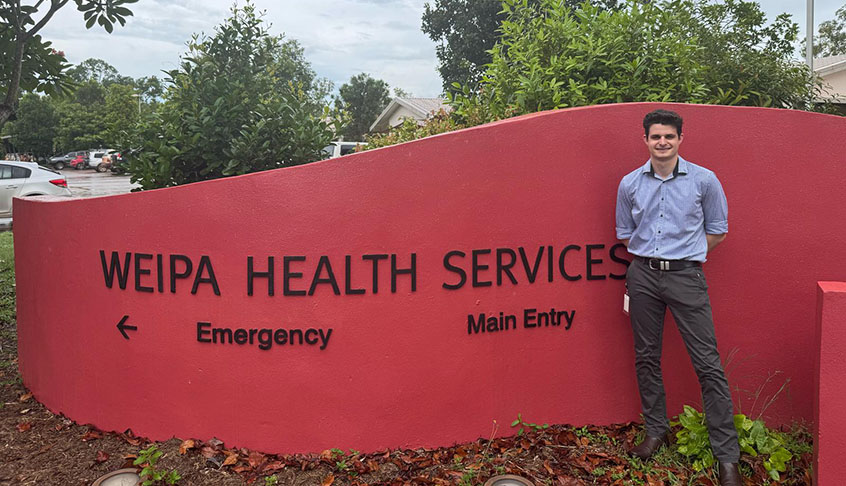
As a junior doctor, I’ve had the privilege of completing 2 John Flynn Prevocational Doctor Program (JFPDP) rotations in just 2 years. I initially completed a 10-week term in Babinda in 2024, where I spent time across general practice, emergency, ward and residential aged care settings. I’m currently completing a 12-week placement in Weipa, where I have similarly been working in a broad range of settings. I am passionate about rural medicine and have really enjoyed practising in rural Far North Queensland communities.
Different rotations offer different experiences
Both of my JFPDP rotations have exposed the complexities of working in rural communities, such as the limited local resources. There tends to be a greater emphasis on your own examination skills to guide decision-making, as you don’t always have access to the medical imaging or pathology labs that you have when in a more populated setting.
The 2 communities where I’ve completed placements have been vastly different. I saw the benefits of continuity of care working in a small town like Babinda, where you might see a patient in the emergency department and then follow their journey throughout the rest of your rotation in general practice. In comparison, it’s been eye-opening to be exposed to the remoteness of work in Weipa. It can be challenging caring for a complex or unwell patient in such a remote setting, as often it may take days for retrieval to a tertiary hospital.
The biggest difference between the 2 communities has been their remoteness. While Babinda is less than an hour’s drive from the nearest regional city of Cairns, a trip to Cairns from Weipa requires a flight, which is often subject to cancellations during the wet season. Additionally, the primary industries of both towns were unique, with the economy of Babinda being based on farming, while the main industry of Weipa is mining.
Immersing myself in the local community
One of the most rewarding aspects of the JFPDP is the chance to work in communities that I have never visited before. During both rotations, I have been able to immerse myself in several local events including social sports, weekly trivia nights, and local festivals and shows. I’ve also enjoyed the proximity of both sites to the coast. I’ve been fortunate to be able to go boating and fishing in Weipa and to go swimming at the Babinda Boulders last year.
JFPDP and rural generalism
My JFPDP experience has really reinforced my rural generalist career aspirations. I’ve worked in general practice, emergency medicine and various subspecialty settings and was able to develop a broad skillset which is vital for rural generalist training and practise. JFPDP also offers opportunities for networking and career planning by working closely with rural generalists of different skillsets.
Support during rotations
I have been fortunate to work with, and be supervised by, several different GPs and rural generalists with advanced skills in anaesthetics, obstetrics and gynaecology, internal medicine, emergency medicine and paediatrics, across both rotations. I have regular contact with my QRGP Rural Generalist Training Advisor, Dr Coventry in Cooktown. I have also been able to work with fellow junior doctors who share similar interests in rural medicine during my rotations.
Making the most of JFPDP education offerings
During my rotations, I’ve made use of online resources including ACRRM’s education modules. I’ve also attended the QRGP’s weekly Statewide Rural Education Prevocational Program (StREPP) sessions, which have been incredibly helpful in enhancing my knowledge of both primary healthcare and emergency medicine in rural contexts.
StREPP has complemented my placements, providing education and discussions on a variety of topics that closely resemble real-life clinical experiences. I’ve also had the opportunity to participate in weekly formal teaching sessions, led by my supervisors and visiting clinicians, which have further enriched my training.
A stepping stone to GP training
JFPDP rotations have been a huge benefit prior to commencing GP training. Other than exposure to a primary care setting as a medical student, your early prevocational years are mostly spent in a hospital setting. The JFPDP provides a smooth transition to primary healthcare and work in a general practice setting in a supported environment.
Determining advanced skill training interests
One of the most rewarding aspects of working alongside rural generalists has been the chance to explore various advanced skills disciplines. While I am yet to decide which discipline I would like to undertake in my own training, it has been interesting to see the differences in completing a cognitive AST, such as internal medicine, paediatrics or mental health, compared to a procedural AST, such as anaesthetic or obstetrics. I’ve gained a better understanding of how these advanced skills benefit the communities they serve.
Looking ahead
I’m definitely considering another JFPDP rotation as a junior doctor before commencing my rural generalist training. As I am based at Cairns Hospital, there are many sites available to complete placements, from the eastern coast and the Atherton Tablelands all the way up to the Cape York Peninsula and Thursday Island.
Why you should consider a JFPDP rotation
A JFPDP rotation is a unique opportunity to work in primary healthcare, enhance your skillset and broaden your professional experience. These rotations have offered me invaluable experience in rural healthcare settings, and I’ve learned a great deal about the challenges and rewards of working in these communities.
I would recommend completing a JFPDP rotation. It will undoubtedly be a very rewarding experience.